
In recent years, global warming and the resulting climate change have become major issues that threaten people's lives and livelihoods.
The steel industry has been playing an important role as a major industry supporting Japan's infrastructure, but at the same time, it is the industry that accounts for the largest share of Japan's total CO2 emissions (13.6%) due to its high energy consumption. Therefore, we recognize that the role required of the industry as a whole is also very large.
Our Group will also take these issues and situations seriously and conduct sustainable business by proactively working to improve our technological capabilities and energy efficiency.
CO2 Emissions by Industry
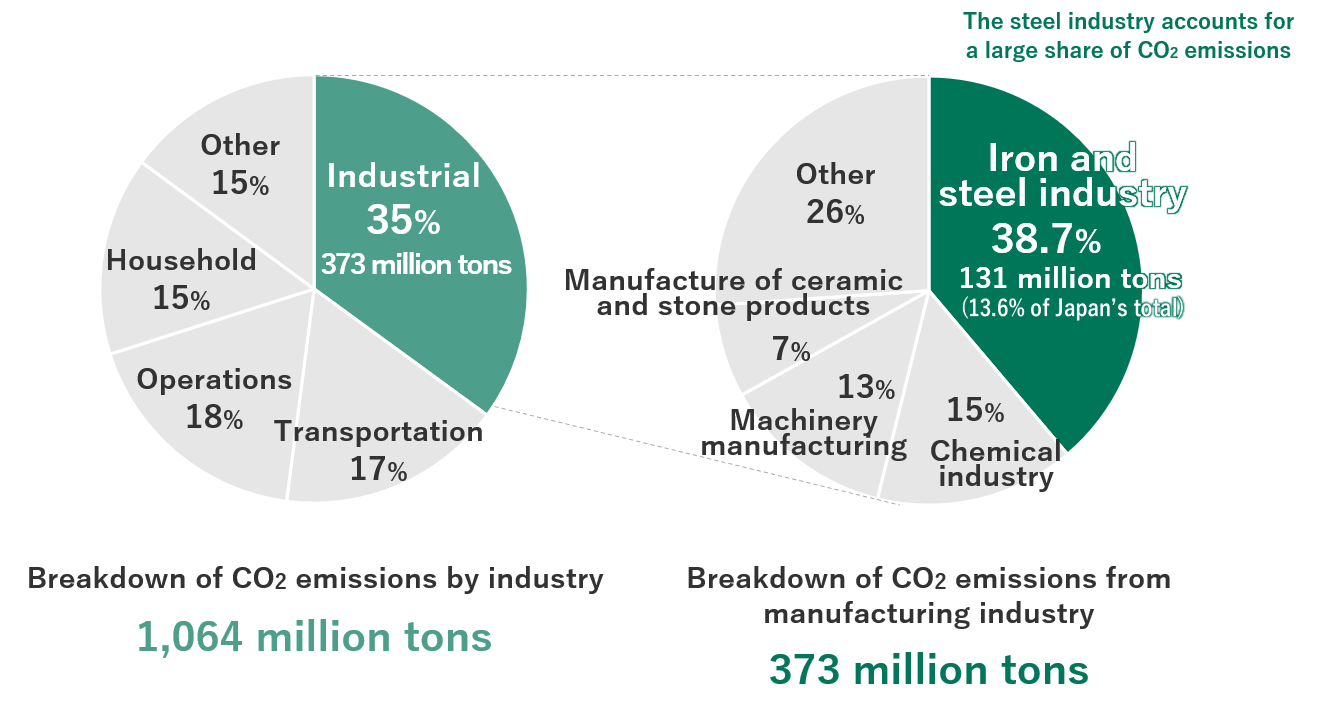
(Source: Ministry of the Environment, FY2021 Greenhouse Gas Emissions)
Iron is not only abundant in the world, but it is also inexpensive and easy to process, and its reuse rate is over 90%, making it a "semi-permanently recyclable material”. By establishing complete recycling (closed-loop recycling) that maximizes these characteristics, our group aims to reduce the number of natural resources mined and the energy consumed.
There are two main ways to make steel products: the blast furnace method and the electric furnace method. The method that uses mined iron ore as raw material to produce iron is called the blast furnace method. Since Japan depend on overseas sources for iron ore, CO2 is generated during transportation and also during the manufacturing process when coal is added. In addition, once the furnace is cooled down, it takes time to reheat it, so it needs to be operated for 10 to 15 years, which makes it suitable for mass production but also makes it difficult to adjust production.
On the other hand, the electric furnace method, which is the manufacturing method used by our group, uses steel scrap as the main raw material. Since there is a large amount of steel scrap in developed countries, it is possible to procure steel scrap domestically for "local production for local consumption," which not only contributes to the local economy but also reduces CO2 emissions from transportation. In addition, since the process uses electricity to generate heat, the amount of CO2 generated is about one-fourth that of the blast furnace method, and production can be easily adjusted by operating at night when electricity is cheaper.
In Japan, the electric furnace method accounts for about a quarter of domestic crude steel production as of 2019. In the U.S., the ratio of electric furnaces has grown significantly in recent years, to around 70%. The global share of electric furnaces is about 30%, and blast furnace manufacturers in Japan are beginning to shift to the electric furnace method.
Closed-loop Recycling of "Iron"
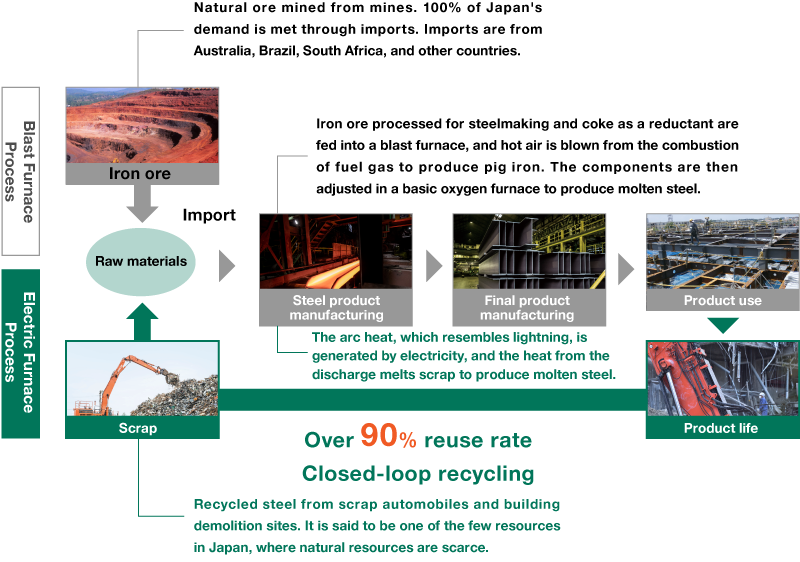
Features of the Electric Furnace
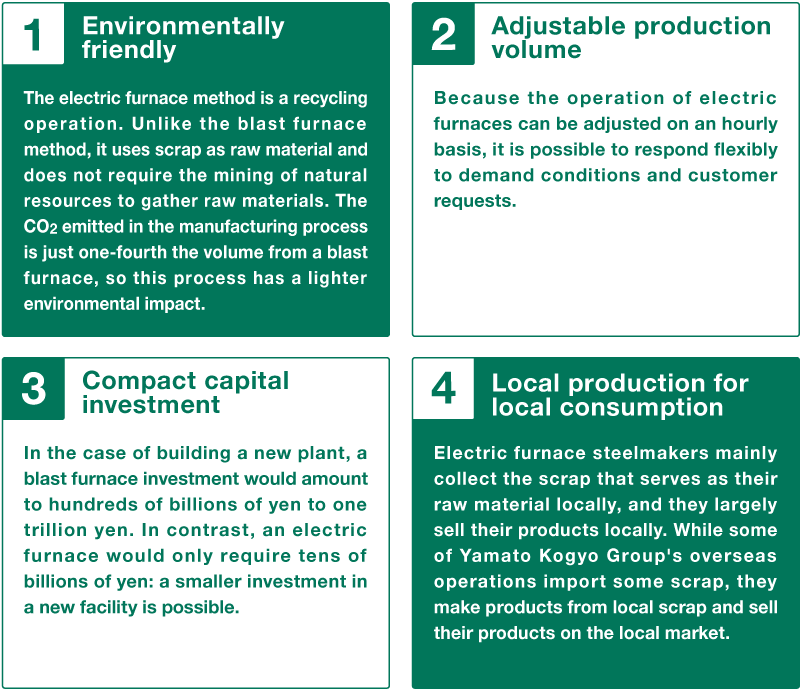
Our Group is particularly committed to environmental initiatives in the electric furnace industry. Yamato Steel Co., Ltd., the core company of our Group, became the first company in the industry to adopt a single-stage preheater (SSP) in fiscal 2019, which achieves significant energy savings by using the high-temperature gas emitted from electric furnaces to preheat steel scrap in advance, thereby reducing CO2 emissions.
In addition to these efforts, we have also increased productivity through the introduction of regenerative burners, low-temperature rolling, automation of operations, etc. We have also taken advantage of our strength as one of the first companies in the steel industry to expand globally, and have worked with overseas group companies to improve our technological capabilities and energy efficiency. As a result, our Group can produce steel with about one-sixth the CO2 emissions of blast furnace manufacturers and more than 25% less CO2 emissions than general electric furnace manufacturers, making a significant contribution to reducing environmental impact. In addition, we are the first company in the domestic steel industry to be certified under two types of environmental declarations, the EcoLeaf and the Carbon Footprint of Products (CFP), both of which are certified by the Sustainable Management Promotion Organization.
In the future, we plan to install an exhaust gas analyzer for steelmaking electric furnaces and upgrade rolling straighteners and mills in stages over the next two to three years. We hope that the introduction of this system will not only reduce CO2 emissions and streamline production by saving energy but also improve customer satisfaction by manufacturing higher-quality products.
Siam Yamato Steel Co., Ltd. (SYS), a group company in Thailand, is actively implementing environmental measures such as the use of natural energy through solar power generation and the promotion of waste heat utilization. In 2017-2020, we have installed 2.84MW of solar power generation equipment, which is expected to reduce CO2 emissions by approximately 2,000 tons per year. In addition, an additional 2.76 MW of solar panels are scheduled to be installed in 2021, bringing the total amount of renewable energy installed to 5.60 MW. We are also considering participating in a project to construct a water power generation facility sponsored by the Provincial Electricity Authority of Thailand (PEA) and the Industrial Estate Authority of Thailand (IEAT), which will enable us to reduce the electricity procurement price if introduced.
SYS have introduced the ORC (Organic Rankine Cycle), which uses waste heat from the heating furnace to generate electricity, and the electricity generated is used within the plant.
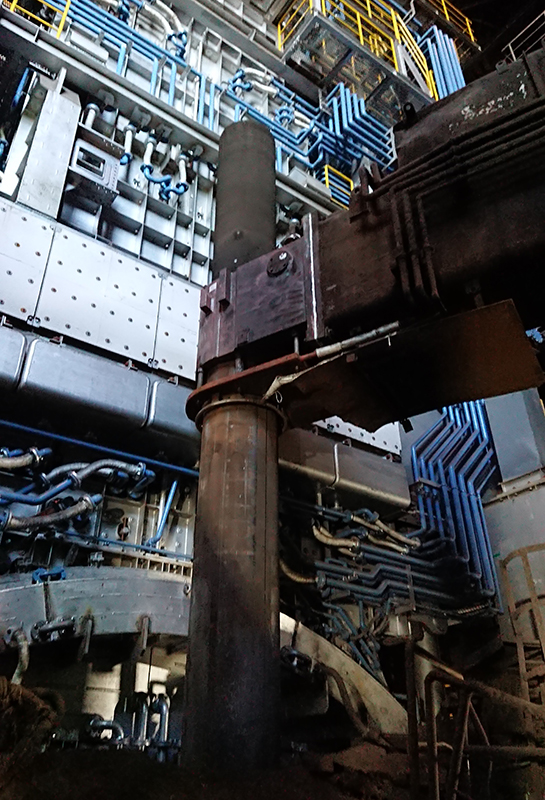
Single stage preheater (SSP)
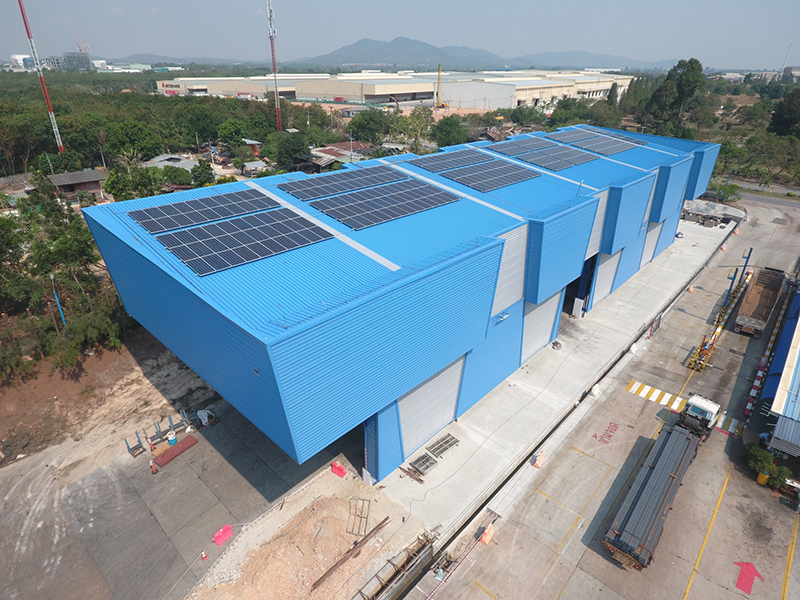
Solar power generation equipment installed in Thailand (SYS)
Comparison of CO2 Emissions between Blast Furnace, General Electric Furnace, and Our Company
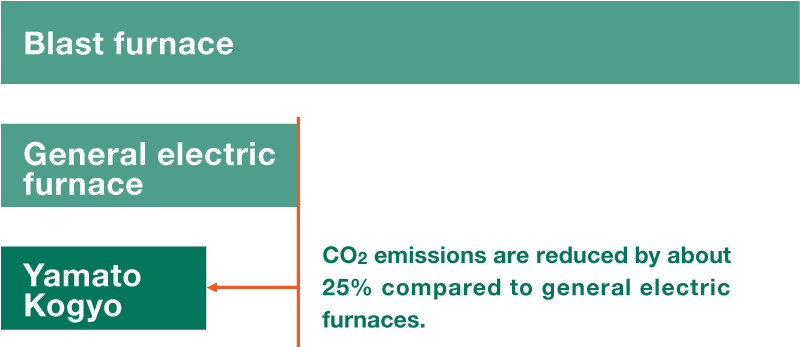
We were one of the first Japanese electric furnace manufacturers to expand our business globally and currently operate in seven countries around the world. As a pioneer in global expansion, we have supported the infrastructure and development of each country and region through our steel products and trackwork materials businesses, and have contributed to the promotion of local industries and the creation of employment by passing on technology. We are also committed to fulfilling our responsibility to the global environment as a group by taking advantage of the unique characteristics of electric furnaces, which enable local production for local consumption, and by successfully integrating the know-how we have cultivated in Japan with the characteristics of each region while reducing the environmental impact of the entire life cycle.